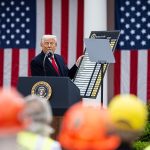Mark Carney, the newly installed Prime Minister of Canada, seems to have taken a page from his predecessor’s playbook, attempting to muster outrage over President Trump’s latest tariffs. Unsurprisingly, Carney found time to disparage a set of tariffs targeting countries that impose exorbitant fees on American goods, even though Canada is not directly affected due to its status under the United States-Mexico-Canada Agreement (USMCA). Perhaps Carney is simply eager to stir the pot and remain relevant in his new role.
President Trump recently proclaimed “Liberation Day” to announce a slate of tariffs on several nations that have not exactly been hospitable to American exports. The list contains some serious offenders: Cambodia, Vietnam, and Madagascar, all of which impose tariffs so high they might as well be charging for the air being used to breathe. In response, these countries are now hit with tariffs ranging from 46% to nearly 50% on goods sent to the U.S.
Amidst the economic euphoria rippling through the American market, Carney took to video for what seemed to be a dramatic reading rather than a genuine policy statement. He promised to “fight” these tariffs and envisioned his nation morphing into the “strongest economy in the G7.” Sounds great in theory, but one has to wonder how “fighting” the tariffs will unfold when Canada doesn’t actually bear the brunt of them in the first place.
The irony of Carney’s position is painfully apparent. As the White House noted, thanks to the USMCA, goods trading between the U.S. and Canada will continue to enjoy a lovely 0% tariff. This little nugget of information was conveniently absent from Carney’s emotional tirade, which instead focused on how these tariffs would negatively affect the U.S. economy. Perhaps Carney’s notion of “fighting” looks an awful lot like quietly reaping the benefits without confronting the facts.
Carney’s approach seems largely rooted in trying to distance Canada from the United States, claiming the “old relationship was over.” Yet, when push comes to shove, he still finds himself on the phone with Trump, who described their recent conversation as “extremely productive.” Sounds like the cracks in his bravado may be showing. Perhaps Carney should consider whether opposing tariffs that don’t impact Canada is a winning strategy, especially since many Canadian goods already face steep tariffs.
Caught between wanting to be seen as a strong leader and the reality of economic interdependence, Carney’s rhetoric may soon give way to reality. Economic success often comes from practical partnerships rather than emotional reactions, a lesson that may become apparent as his term progresses.




